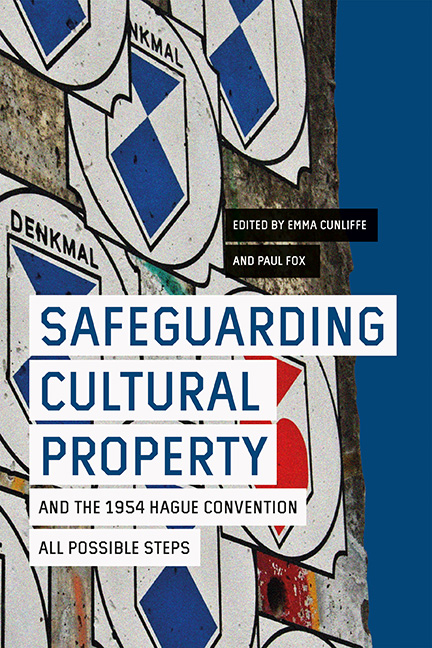Book contents
- Frontmatter
- Contents
- List of Illustrations
- List of Contributors
- Plate Section
- Acknowledgements
- List of Abbreviations
- Preface: The Blue Shield and the Protection of the World's Cultural Property – Preparing in Peace for Conflict
- Part I Safeguarding – Reassessing the Field
- Part II Historical Perspectives
- Part III Current Issues in Legal Implementation
- Part IV The Hague Convention in Practice Today: Tools and Approaches
- Appendix 1 The Hague Convention for the Protection of Cultural Property in the Event of Armed Conflict with Regulations for the Execution of the Convention 1954
- Appendix 2 Regulations for the Execution of the Convention for the Protection of Cultural Property in the Event of Armed Conflict
- Appendix 3 Resolutions of the 1954 Hague Conference
- Appendix 4 Second Protocol to the Hague Convention of 1954 for the Protection of Cultural Property in the Event of Armed Conflict 1999
- Appendix 5 Additional Protocols (1977) to the Geneva Conventions (1949) (Extracts)
- Index
- HERITAGE MATTERS
13 - ‘The Lone and Level Sands Stretch Far Away’. The ‘54 Convention in situ: Perspectives from an Accidental Practitioner
Published online by Cambridge University Press: 26 May 2022
- Frontmatter
- Contents
- List of Illustrations
- List of Contributors
- Plate Section
- Acknowledgements
- List of Abbreviations
- Preface: The Blue Shield and the Protection of the World's Cultural Property – Preparing in Peace for Conflict
- Part I Safeguarding – Reassessing the Field
- Part II Historical Perspectives
- Part III Current Issues in Legal Implementation
- Part IV The Hague Convention in Practice Today: Tools and Approaches
- Appendix 1 The Hague Convention for the Protection of Cultural Property in the Event of Armed Conflict with Regulations for the Execution of the Convention 1954
- Appendix 2 Regulations for the Execution of the Convention for the Protection of Cultural Property in the Event of Armed Conflict
- Appendix 3 Resolutions of the 1954 Hague Conference
- Appendix 4 Second Protocol to the Hague Convention of 1954 for the Protection of Cultural Property in the Event of Armed Conflict 1999
- Appendix 5 Additional Protocols (1977) to the Geneva Conventions (1949) (Extracts)
- Index
- HERITAGE MATTERS
Summary
A vantage point, whether intellectual or topological (figure 13.1, previous page), can occasionally be reached by finding one has wandered up an unexpected slope. This paper will show more footfall and less of the library as a result, reviewing the obligations arising from the UK's recent ratification of the 1954 Hague Convention for the Protection of Cultural Property in the Event of Armed Conflict and its Protocols (‘the Convention’) for deployed armed forces in the context of safeguarding, from personal experience. Although proactive safeguarding in advance of conflict is the responsibility of the nation responsible for the heritage, I consider here the effects on mission when such responsibilities are absent.
I argue that, for the UK, a significant starting point to first note is that its approach has been evolutionary rather than revolutionary. When making conscious decisions, those in positions of responsibility would default to preservation rather than defacement as part of the British military's broad values and standards. I would tendentiously also suggest that, for many decades, schooling may also have played a part, at least for staff officers operating around antiquities they were culturally familiar with, or at least interested in not deliberately degrading.
Despite having signed the Convention in the 1950s, the UK ratified it and both Protocols in 2017, bringing them into UK law in the Cultural Protection (Armed Conflicts) Act 2017. Now that the UK has ratified though, is it relevant, or has it come too late to bring meaningful effect? To answer that, one really has to take the subject in the round.
The Convention establishes that cultural property safeguarding measures should be completed in advance by the nation responsible for them, but UK forces frequently have been, and continue to find themselves, operating in countries where that is not the case. Public perception argues that the responsibility to protect sites from any and all threats therefore falls to troops on the ground. Given the finite capabilities any UK commanders will ever have at their disposal, especially in combat environments, I would suggest the issue is also consequently not really one about pursuing revolutionary change on the ground or within the Ministry of Defence Main Building.
- Type
- Chapter
- Information
- Safeguarding Cultural Property and the 1954 Hague ConventionAll Possible Steps, pp. 219 - 234Publisher: Boydell & BrewerPrint publication year: 2022



